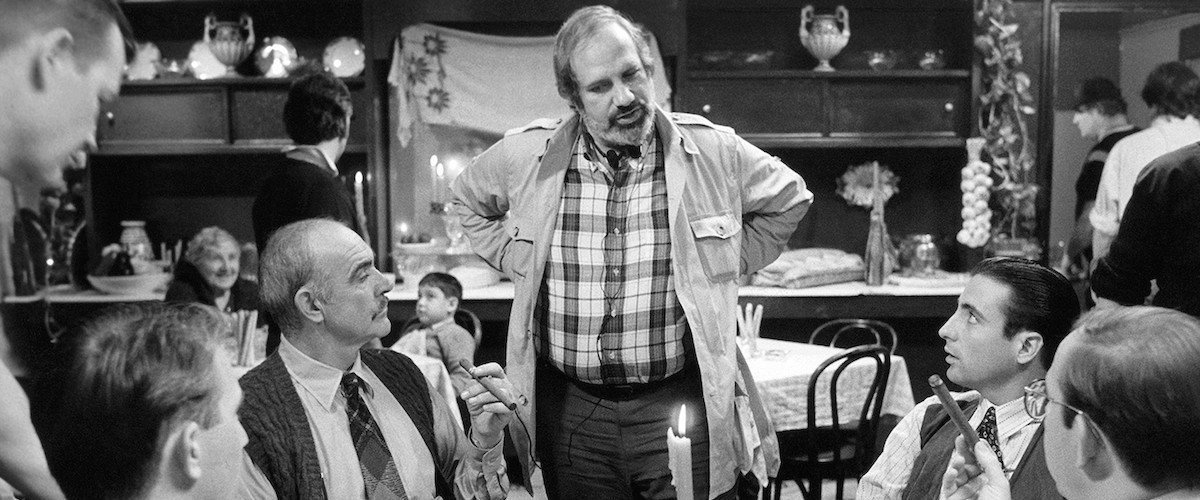You must
wade through a pile of female corpses to glimpse Brian De Palma’s special
grace. Since dazzling moviegoers in the 1970s with Carrie, he’s often been derided as a
chronicler of violence, especially against women, and badgered for being too
worshipful of Alfred Hitchcock, as if wearing his influences so boldly only
blinded viewers to the many subtleties and secrets found in his art.
Brian De
Palma’s career defies easy categorization. It’s convenient to forget that,
along with his many homages to Vertigo
and Psycho, he’s made gangster films,
sci-fi, war movies, and comedies. He no more relies on violence against women
than Spike Lee relies on racism, or John Ford relied on Arizona.
Settling
into De
Palma, a tasty, intelligent tribute from Noah Baumbach and Jake
Paltrow, we can’t help but appreciate De Palma’s career for the marvelous thing
that it is: not a bunch of senselessly gory movies where women are eviscerated,
but a vibrant roadmap through a half century of American culture – from ‘60’s
anti-war comedies, to ‘70s horror and glitter, to 80’s excess (any director
responsible for Scarface, The
Untouchables, and Bruce Springsteen’s ‘Dancing in the Dark’ video would be
worthy of the canonization that eludes De Palma), to the 1990s, when a piece of
fluff like Mission Impossible became
his biggest hit – that should be studied and appreciated by every director,
would-be director, and lover of movies. By simply aiming a camera at him and
letting him talk, Baumbach and Paltrow have created a strangely moving portrait
of a man who knows his best work may be behind him, not because he’s no longer
interested or capable, but because the movie business no longer has room for
him. Our loss.
As a
raconteur, he’s fair. He’s humble about his successes, saying only that
everything worked out well in those cases. Of more interest is the way he
reacts to his failures, cackling like a man who gambled away his home and
remains impressed by his own audacity. But this master of intricate plots is,
at heart, a man of few words. His favorite expression, dropped a half dozen
times during De Palma, is “Holy
mackerel.” He doesn’t share much behind
the scenes gossip, though we get the impression that writers, studio heads, and
feminists, are a pain in his ass. Other than Sean Penn teasing Michael J. Fox
about being a television actor, we don’t learn much about De Palma’s actors.
The Hitchcock question comes up, and he fields it smoothly, saying that he admired
Hitchcock’s style and proudly carries on the tradition. He’s Tony Bennet to
Hitchcock’s Frank Sinatra.
A member
of 1970s “Young Hollywood,” when his circle of friends included Steven
Spielberg, George Lucas, and Martin Scorsese, De Palma doesn’t rhapsodize about
the good ol’ days, saying only that such a time is unlikely to happen again. Of
his overstated reputation for depicting violence against women, he maintains that
the scenes in question seemed right for the movies he was making at the time.
Then we’re treated to a clip of Angie Dickinson being butchered in an elevator.
His
comments on moviemaking sound like the words of a journeyman. He suggests that
a director can’t control his career, but can only do his best with the
opportunities that come up. Still, the clips of Casualties of War, Carrie, Dressed to Kill, Phantom of the Paradise, and Blow Out have more cinematic verve than
any dozen movies you’ll find in any cinemaplex today, reminding us again that few can match De Palma in terms of sheer eye candy. Another treat: the
alternate ending of Snake Eyes, where
a tidal wave of Biblical heft wipes out a Las Vegas casino. The scene recalls
something from the silent era, a D.W. Griffith storm where evil is vanquished.
A few
tidbits about his teenage years are fascinating, such as following his father
with a camera when he suspected the old man was having an affair. Though this
feels like a scene from one of his movies, De Palma isn’t much for connecting
the dots between his childhood and, say, Body
Double. The closest he comes to a
big-time revelation is when he mentions that his career is probably behind his
three failed marriages, and that it can’t be fun to be with a man who says, “My
movie is my wife, not you.”
Brian De
Palma was at his best when he showed characters, whether a rough Cuban
gangster, or a teenage girl with telekinetic powers, or a sound engineer who thinks he's on to a crime, coming out of their
isolation into a kind of dream world, a stylized, expressionistic version of
America, one that is grotesquely beautiful but loaded with traps. He should be
ranked among the best directors, but he isn’t. He’s simply De Palma, the
Hollywood equivalent of the homerun slugger who either smashes the ball or goes
down swinging. A reassessment is in order, for De Palma’s versatility recalls
the great directors of Hollywood’s golden age. This documentary is a start. But
even Baumbach and Paltrow present a slightly skewed message. After giving the
man a chance to explain himself, they
end their movie with a posed photo of De Palma standing over what looks like a
female corpse, one apparently split apart by power tools. He has the slightly
bored but formal look of an office worker, neither apologetic nor triumphant.

No comments:
Post a Comment